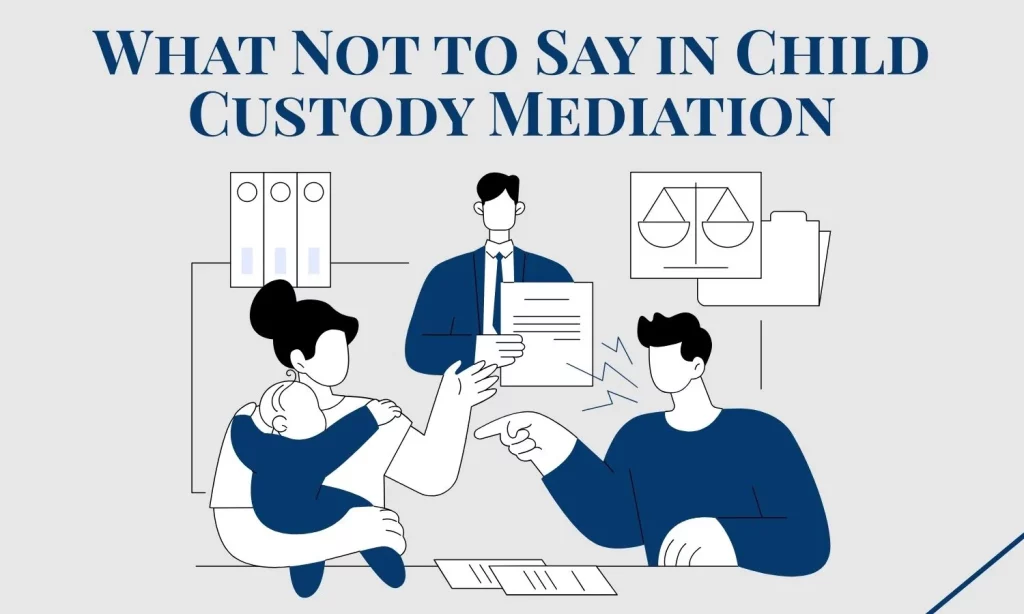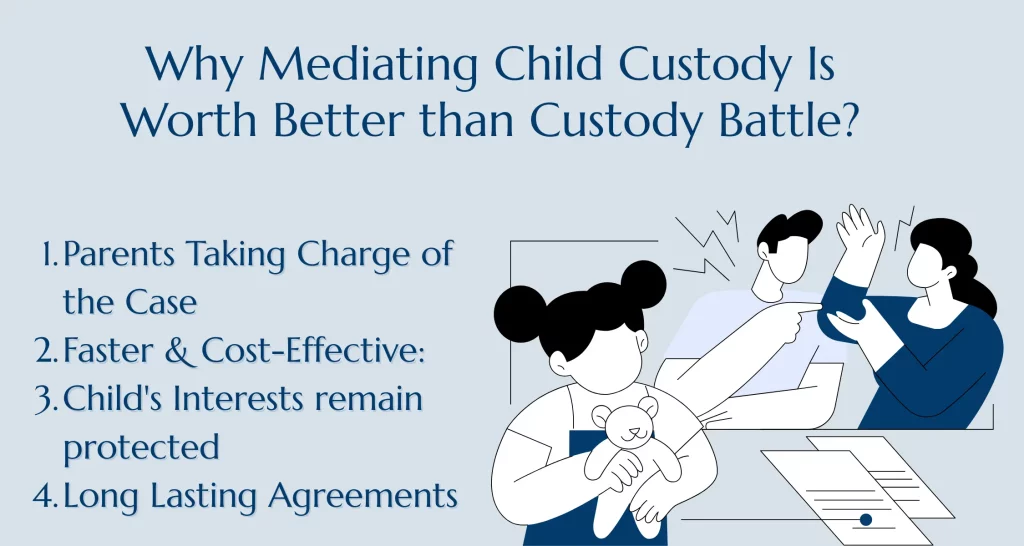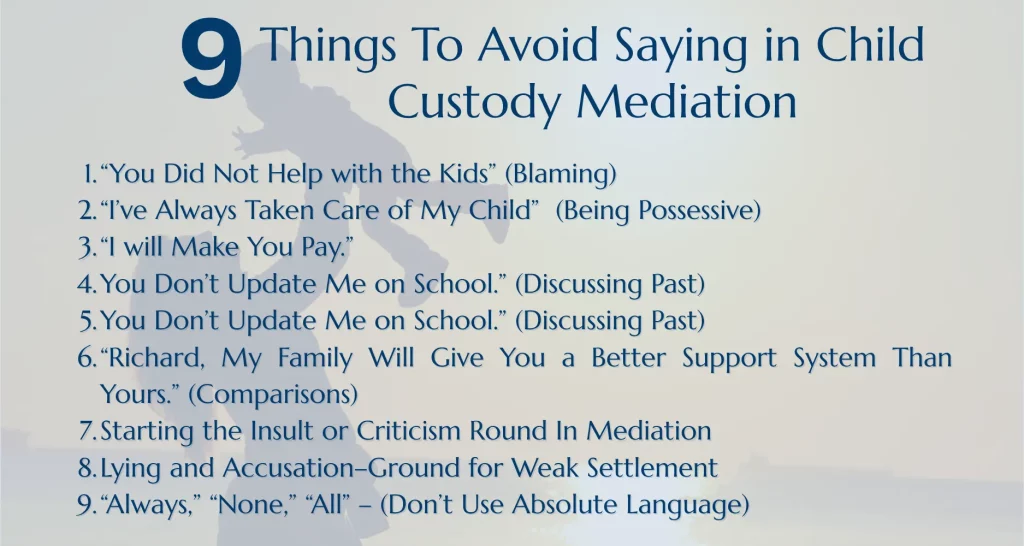Providing Divorce Mediation Services Throughout California
Providing Divorce Mediation Services Throughout California
Home » Divorce and Family law Blog » What Not to Say in Child Custody Mediation [Updated 2025]

Dina Haddad and her team provide expert mediation services for Californians. If you want help related to any family law issue, call us or book a consult.
Child custody mediation in California helps parents reach an agreement effectively and amicably regarding conflicts related to the child in the most affordable way possible – no court involvement and no pricey attorneys.
It is also a required agreement in a divorce matter if the parents have minor children.In mediation for custody, you do want to prepare your thoughts as to what custody plan might work well for your child(ren) and why. You don’t need to have the answers given, the mediator will help you think of solutions.
Remember, it’s to your and your children’s benefit to work with your spouse. But what should you not say during mediation? Blaming, using possessive language, discussing past issues, and talking aggressively hurts your chances to successfully mediate and achieve your goals.
But what you should say and what not in custody mediation also affect your productivity, mediation costs and your ability on how quickly you reach mediated agreement.
Blames, demands, use of possessive and abusive language or starting the insult round can make mediation look like a typical custody battle – leading to low quality agreements.
If you want to know that child custody mediation is a right fit to your case, book a FREE Child Custody Checklist with Dina Haddad – California’s top-rated child custody and support mediator.
This article discusses 9 unique ideas to prepare you better for your next child custody mediation sessions.
Child Custody Mediation – one of the alternate dispute resolution methods – helps divorcing and separating couples and unmarried parents resolves their child (physical or legal) custody issues without litigating. Mediation is peaceful and helps parents agree on the most challenging aspect of divorce or legal separation. Some common disputes of child custody include discussing parenting responsibilities, child support, visitation schedules, travel rules, and co-parenting agreements.
Here are some quick benefits of mediation in custody matter:

The following are reasons why mediating child custody is a better option than a court custody battle.

Custody mediation is not the right platform to express negative opinions, conflict, and unproductive behaviors about your spouse or marriage.
The golden rule of custody mediation is to negotiate with your spouse without hurting them.
Staying civil and respectful helps you reach a quality agreement. The following are the custody mediation tips to help you better understand what not to say in child custody mediation.
Discussing a spouse’s past mistakes and blaming and shaming them in custody mediation is a minimal must to avoid. Expert custody mediator Dina Haddad reports that she has seen spouses blaming each other and this way the essence of mediation–cooperation disrupts.
Mediation can be emotional and spouses must refrain from expression of blaming words such as “You never understand children’s needs.” “I do, but you don’t.” Or, “this is your fault. You don’t understand the situation.”
If you blame, it’s more likely that your spouse will become defensive after listening to your criticism, which can escalate conflict and hostility. Always remember that you’re in custody mediation to establish an agreement that can benefit the child’s well-being.
Therefore, how you discuss issues in parenting needs to be centered on reaching an agreement or making positive changes for your children’s benefit.
Another thing that can make custody mediation look like a contested custody battle is when either parent uses possessive language.
The spouse who joins custody mediation to reach long-lasting agreement but sees another parent becoming possessive can be a hurtful experience for that spouse. In fact mediation is highly not recommended when one of the spouses is dominating or manipulating.
So how should parents behave then? Try your best to consider the other parent in the parenting relationship. Avoid possessive statements when you refer to your child during the discussion, such as “my child” or “my kids.”
One simple trick to stop being possessive is by replacing possessive pronouns (I, my, me, etc.) with phrases like ‘our kid’ or ‘our son’ to let your co-parent feel involved in the process.
The golden rule of mediation is not to make demands and promises because making specific promises during this decisive stage, due to pressure or expectations, can be problematic.
Be careful about your requests. Asking for unnecessary child support or denying access to your co-parent — without substantive proof that your child(ren) would be in harm’s way– could be less productive for mediation.
Rather do your best to position your requests reasonably. Offering suggestions and presenting concerns allows for open communication and solutions — without pushing your spouse away.
Anger management in custody mediation is essential– uncontrolled anger often results in no deal being reached. However, the productive custody mediation is about logic and reason. It’s about negotiation and not my way or the high way mindset.
Nonetheless, custody mediators are experts in managing conflict and confrontational situations, the expression of unproductive behaviors should be avoided as they finally lead to the court route – making custody process far more expensive.
Child custody mediation unlike litigated process is casual and informal and requires parents to stay civil to reach quality custody agreements.The following are the don’ts of behavior in custody mediation.
Sometimes you may be required to discuss issues or problems — related to custody— with the purpose to unfold solutions and reach agreement that best aligns with parents and children’s interests.
So if a custody mediator asks you to discuss issues, always present them in a manner that helps achieve the end goal: Your children’s best interests. Consider the best manner to discuss important issues that impact your children positively without pushing your spouse out of the conversation.
Making unreasonable comparisons in mediation for child custody could make it go wrong and make the other involved party to feel threatened and become defensive.
The parties in mediation should not make comparative statements about one another. Picture this scenario: “I can provide a better lifestyle for our child/children.” Or, “You can’t care for the children the way I can.”
Most participants in child custody mediation remain professional and follow the ethical rules as described by their mediators. But the professionalism and courtesy may disappear when participants become too emotional or in the heat of the moment.
While custody mediation demands you to be reasonable and treat mediation like business negotiation. Therefore, don’t retaliate with insulting demands with insulting arguments and responses.
Likewise, don’t criticise your custody mediator. If you feel that your mediator is biased and the agreement would result in unfavourable settlement, talk to your mediator about their biased behavior or if you’ve legal representation in mediation let them know about the bias in mediation, they would advise you on this or talk to your mediator about the unfairness.
Other things you can do in such scenarios is filing a complaint of mediator’s biased behavior with the mediator’s organisation or withdrawing from mediation and requesting a new mediator.
Dishonest behaviors —lying, disputed facts, and accusation — in custody mediation is a breach of ethical behaviors and makes settlement less favorable for both spouses.
Also, the attorneys involved in mediation also need to de-emphasize accusations in mediation, this way mild exaggeration and fraud would be discouraged because presenting the unprovable things and lying leads to bad reputation and loss of trust, increasing the difficulty of reaching long-lasting agreements.
Starting custody mediation with flexible thinking can prevent generalization and exacerbation of conflicts because “all or nothing” thinking does not promote compromise and cooperation.
Absolute language by one spouse can divert the attention of the other spouse to finding exceptions, which could affect the child’s best interests. So never use absolute language and try finding common grounds.
Winning a child custody mediation in California requires proper strategy and knowing how to present yourself when attending mediation.
This section throws light on tips for parents to mediate child custody effectively.
Use “I” language (aka “I” statements?) “I” statements are communication techniques for expressing your needs and feelings without blaming others or discussing other’s faults. Using I-statements would promote cooperation and open communication and your spouse will feel respected, allowing you two to focus more on the child’s best interest over personal matters. Here’s an example of neutralizing blaming language with “I” statement:
If you have discussed your proposals and offered solutions, listen to your spouse’s point of view without interrupting him or her. Your listening does not mean that you agree with every point of your spouse, but it means that you are willing to find common ground. If you have questions, you can ask them later.
Share any ideas you have concerning agreements, custody proposals, visitation schedules, holiday arrangements, and child support.
Discuss practical ideas keeping the child’s well-being and future in mind. The long-lasting agreement will only be possible if both parents commit to discussing the true needs of the child, such as education, daily schedules, developmental needs, emotional well-being, social activities, and medical needs.
Share practical ideas you have concerning agreements, custody proposals, visitation schedules, holiday arrangements, and child support.
This will result in long-lasting agreements that truly align with your child’s educational, daily, developmental, and emotional well-being or needs.
Want to create a long-term custody agreement at a fraction of the cost of a court custody battle? Talk to California’s Best mediator, Dina Haddad, by scheduling a FREE Child Custody Mediation Consult.
The following are the 7 things that you should never say in child custody mediation.
Child custody mediation is an easy, affordable, and peaceful process in California. If you want to make it super easy, never blame your spouse, make promises, and never discuss irrelevant past issues.
The following are the custody mediation tips for mothers and fathers who want to have a successful child custody mediation.
Related: Can you move out of state with a child and no custody agreement?
Families First mediation empowers California parents and divorcing spouses to come to an agreement that works for everyone and is in the child’s best interests. All this can be achieved without a courtroom battle that wastes precious time and resources.
You know that custody is an important part of divorce, and it can be exhausting when both parties don’t see eye to eye. If this is your situation, we can make it easier. Let our team of passionate and professional child custody mediators understand your situation and help. Book a free consult with us.
The following are the 7 don’ts of child custody mediation in California:
The following are the tips for mothers and fathers before attending child custody mediation: